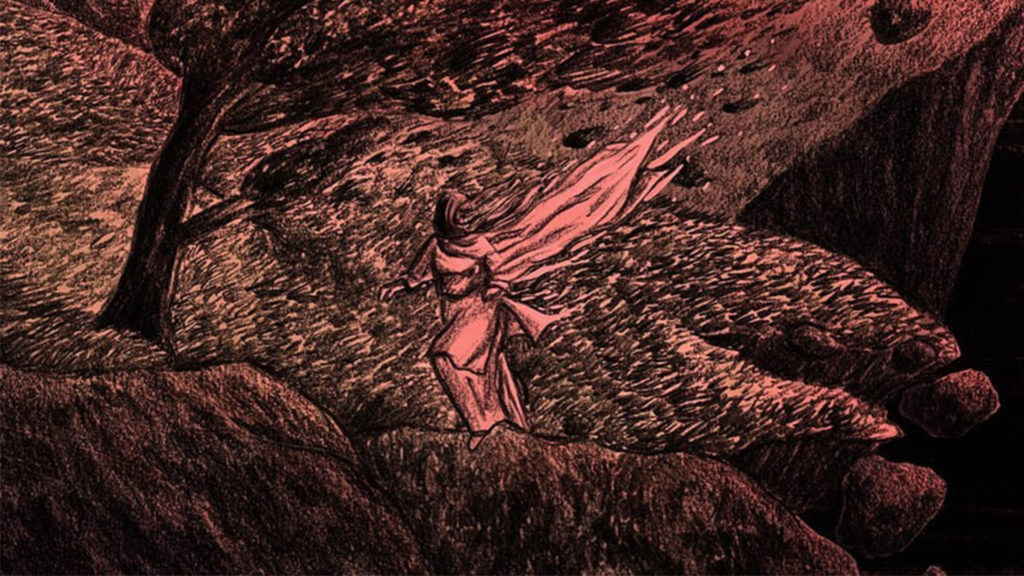In a short, animated film set in 2071, viewers watch as the supreme leader of Pakistan passes a law declaring all expressions other than smiling a crime.
The new future shown in the film “Shehr e Tabassum” is based in a Pakistan where “freedom of expression has been repressed entirely in the name of social order stability and peace,” film director Arafat Mazhar wrote in DAWN, Pakistan’s largest national newspaper, after the trailer for the film was released in 2019, with the full nine-minute short film released a year later on Feb. 29, 2020.
Created by Puffball Studios, “Shehr e Tabassum” became the first of its kind as an Urdu animated film. But, as an artform, the dystopian, sci-fi film gained notoriety for sparking conversations about the nature of present-day society.
Isma Gul Hasan, the creative director of “Shehr e Tabassum,” told New Lines how her artwork has allowed her to become part of an activist movement through storytelling. “Dystopia takes its departure from present and past realities, and in that way is not at all separate from the realities of the day,” Hasan said. “The oppression and censorship in ‘Shehr e Tabassum’ is very relatable, and that’s what makes it so haunting.”
Puffball studios’ second film “SWIPE,” which follows a young boy in a society obsessed with passing death sentences through an app that crowdsources religious verdicts, was selected for the world’s oldest and most prestigious animation festival, the Annecy International Film Festival.
“SWIPE’s” chilling futuristic narrative appears closer than expected to reality, especially when aggressive crowds rallied in the streets and accused the latest women’s march — known as Aurat March, which demands better health care, parity in wages and an end to violence against women — of blasphemy.
“That’s the thing about doing predictive research and writing cautionary tales. We might be writing ‘dystopia,’ but the conflicts we depict are actually eerily close to the attitude and events that unfold in our country,” Mazhar said. He added that when she and her creative team were researching cases for the fictional iFatwa app, they “took inspiration from real life events and only lightly coated them with some absurdity.”
“Shehr e Tabassum” may be the first Urdu animated film, but it comes on the heels of South Asia’s long tradition of fantasy and speculative art. Modern sci-fi in Pakistan, however, is associated in the mind of its audience with the West. But many local artists are trying to reinvent this relationship.
Nudrat Kamal, a comparative literature teacher at the Institute of Business Administration Karachi, wrote in DAWN about the effect of teaching science fiction stories set in a South Asian context.
“Literary scholars have pointed out that the rise of science fiction as a genre occurred at the height of Western imperialism, making the origins of sci-fi complicit with colonialism and its ideologies,” Kamal wrote in her June 2019 article.
However, Pakistani authors are now reclaiming that definition of sci-fi in an effort to make it their own genre. A newer generation of authors is bringing together their past and present to represent what a South Asian-based sci-fi story can mean to the world.
Folk stories like “Ainak Wala Jin” (“The Ghost with Glasses”), Qurratulain Hyder’s time travel story “Roshni ki Raftaar” (“Speed of Light”), and Asif Farrukhi’s “Samandar Ki Chori” (“Theft of the Sea”), which reimagines a Karachi where the sea disappears, are told through the oral tradition and continue to define the childhoods of generations of Pakistanis.
What seems different now is that many of Pakistan’s writers and artists are deliberately harnessing the power of sci-fi.
Indeed, like with other genres of fiction, sci-fi has always offered a platform for social commentary, even if this was unintentional. What seems different now is that many of Pakistan’s writers and artists are deliberately harnessing the power of sci-fi.
“Sci-fi writers have critiqued everything from authoritarianism, patriarchal violence and climate change to the role played by corporations and technology on human societies,” Kamal said. But, she added, the fact that sci-fi in Pakistani society is often dismissed as a genre for an immature audience may be hindering its ability to fully grapple with, and communicate, society’s ailments to the general public.
But this has not stopped sci-fi writer Sidra F. Sheikh “to turn everything we accept or see as prevalent entirely on its head,” as she put it. In her novel “The Light Blue Jumper,” a light-blue, bald alien named Zaaro Nian finds himself caught up in an interplanetary conflict when his work ship collides with a rebel ship. The narrative, which at times can wax satirical, delivers an unflinching critique of Pakistan’s contemporary society.
“My alien civilization viewed roundness of form as the benchmark of beauty. The deeper the blue, the more the snob value. There were people who were grateful for being allowed to live the most basic of existence while serving a colonial power, and by grateful, I mean gushing and fiercely loyal,” Sheikh said.
Sheikh was referring to the colorism and body shaming that runs rampant within Pakistani society. Women with darker skin, for example, or a curvier physique, often endure unabashed discrimination in the workplace and within their communities, like when they seek marriage proposals.
“It’s when things are presented out of context that we are able to see the absurdity of what we take for granted and inevitable in this world of ours,” said Sheikh.
For writer Bina Shah, reading Margaret Atwood’s “The Handmaid’s Tale” drove this point home. “The way Pakistani women live is already a feminist dystopia,” she said, adding that she immediately recognized aspects of this dystopia in Atwood’s novel. “Feminist dystopia might be a way of pointing the imbalance in our society regarding gender equity,” said Shah.
Shah’s “Before She Sleeps,” which examines patriarchal control over women’s fertility and fecundity, may seem new to readers, but it has a predecessor. Rokeya Sakhawat Hossain’s “Sultana’s Dream,” an English-language, feminist utopia from 20th-century colonial India, also subverts patriarchal controls on women’s bodies when it reexamines the women-only spaces that were common in upper-caste, Indian Muslim households.
For other writers, it is the complex relationship between what is true and what is false that makes sci-fi such an interesting genre. Omar Iftikhar, author of “Divided Species,” points out that the technology that defines our lives today — smartphones, video calls and social media — might have been unimaginable to us just two decades ago, but the human experience has remained the same for millennia.
“Writers need to understand that behind a life based on sci-fi, humans are still humans who have feelings, emotions, goals, dreams and face life’s challenges at all levels,” Iftikhar said. Sci-fi stories show different or more advanced technology, but they must “still show humans who have insecurities, fears, ambitions and plans to pursue.”

When it comes to literature, we expect stories to use words to describe its fictional reality. But what happens when a story is told through a silent film, as in “SWIPE”? It seems that the lack of dialogue itself has only amplified the film’s message.
“Every aspect of our films — the premise, characters and the choices they make, the world building, musical motifs — is an authentic creative expression of this critique,” Mazhar said. And this creative expression “goes beyond irony and embraces introspection alongside its fierce protest.”
Choices like this, to blur the lines between fiction and reality, have made “SWIPE’s” international recognition such a win for human rights advocates in Pakistan. The film breathes new life into struggles that have existed for decades with little progress.
But perhaps the value attached to a film receiving international acclaim is, itself, not without irony, as Shah suggests. “What I have seen … is that if a piece of sci-fi — short story, novel — does well abroad, then it tends to get noticed in Pakistan. Otherwise, there isn’t much of a homegrown platform for Pakistani sci-fi,” she said.
There is an active move to change this dependence on external acclaim and encourage homegrown artists and writers to produce work for a domestic audience. The Salam Award is one such platform that aims to encourage and showcase writers of sci-fi and speculative fiction in Pakistan and help move this work into the mainstream. The co-founder of the award, author Usman Malik, said that he envisions “to nurture imaginative, daring fiction writing in Pakistan.”
“We believe the award is creating a community of like-minded writers around it. Hopefully, first they will dare to dream in one way, then rebel against that way, for such is the best way to experiment,” he said.



